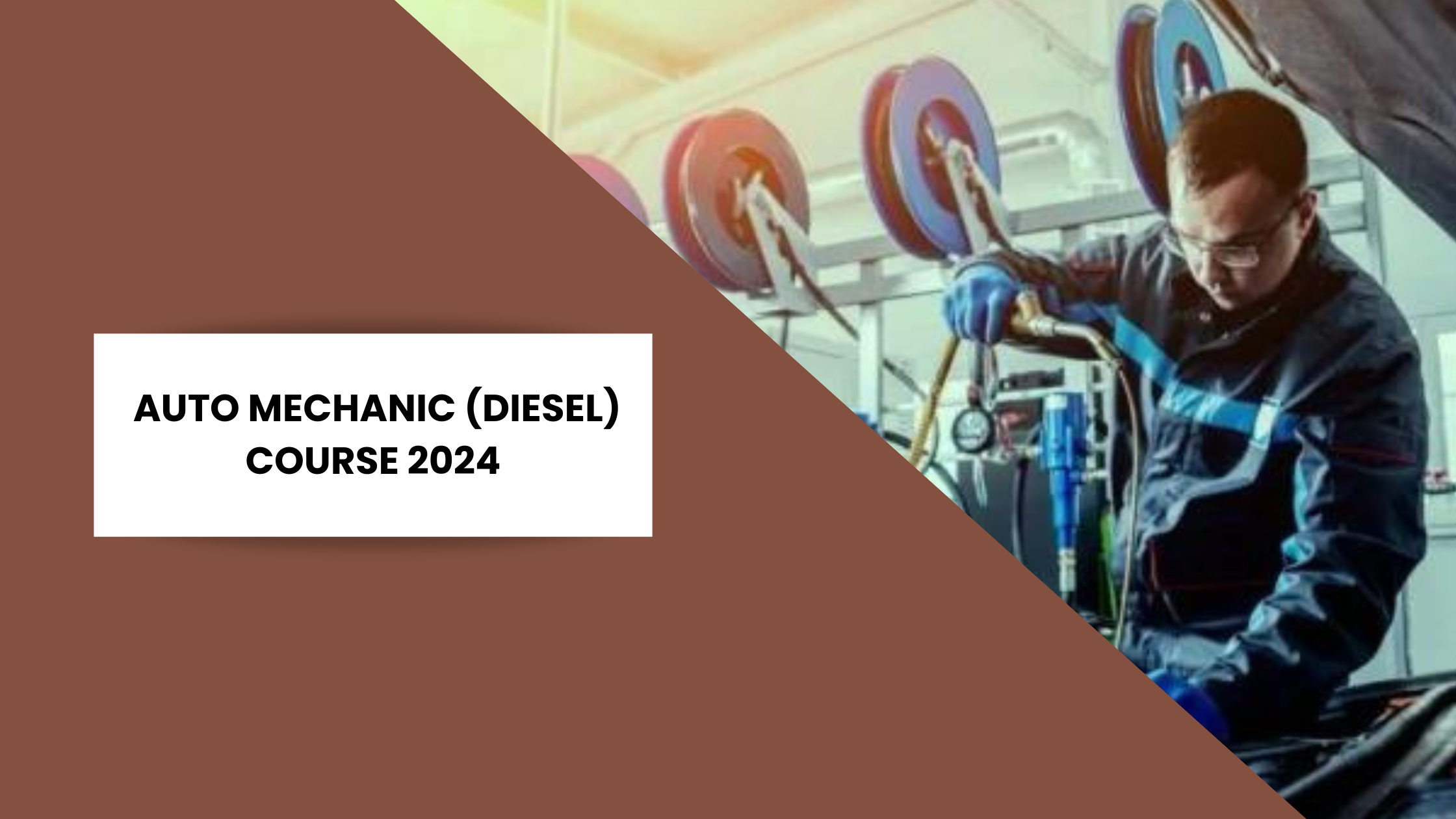AUTO MECHANIC (DIESEL) COURSE
AUTO MECHANIC (DIESEL) course 2025 is designed to provide skills in the assembly and disassembly of diesel vehicle assemblies/sub-assemblies enabling the candidate to carry out minor repairs and tuning of diesel engines including key focus areas that are provided below:
- Efficient use of cutting tools (hacksaw, files, drills, etc.).
- Accurate use of measuring/hand tools.
- Disassembling and assembling diesel vehicle assemblies/sub-assemblies.
- Understanding engine systems operations.
- Diesel fuel supply system circuit diagrams and principles.
- Manual & Automatic power transmission systems.
- Suspension and steering systems.
- Brake systems.
- Efficient tuning of diesel vehicles.
Details About AUTO MECHANIC (DIESEL) course 2025
- Entry Level: Middle
- Total Duration: 6 Months
- Total Training Hours: 800 Hours (40 Hours per Week, 6 Days a week, 7 Hours a day, Except Friday 5 Hours)
- Training Methodology: Practical 80%, Theory 20%
- Medium of Instruction: English/Urdu
Professional Expertise For AUTO MECHANIC (DIESEL) course 2025
Upon successful completion, trainees will be able to:
- Use workshop tools/equipment efficiently.
- Check and inspect engine parts such as camshaft, rocker arm, valve mechanism, piston, connecting rod, crankshaft, and cylinder bore.
- Work on lubricating and cooling systems.
- Set engine timing and bleed the injection system.
- Handle inline and rotary-type fuel injection pumps.
- Remove and refit clutch plates, and pressure plates, and make adjustments.
- Inspect and maintain power trains (Gearbox, Propeller shaft, differential).
- Remove and refit brake system parts and perform brake bleeding and adjustments.
- Remove and refit suspension and steering system parts.
Specialized Knowledge About AUTO MECHANIC (DIESEL) COURSE 2025
Trainees will be able to:
- Explain the correct use of tools/equipment.
- Describe diesel engine operations, types, and construction.
- Understand various engine systems: fuel injection, air induction, exhaust, cooling, and lubrication systems.
- Explain turbochargers and superchargers.
- Understand the workings of the power train, suspension, and steering systems.
- Explain the workings of brake systems, including power brakes, wheels, and tires.
Also see: GAMES & APPLICATION DEVELOPER (6 – Month Course)
CURRICULUM DELIVERY STRUCTURE
| Week | Course Delivery | Co-Curricular Activities/Vacations | Revision | Co Curricular Activities/Vacations | Final Test | Total |
| 1-20 | 20 | 2 | 2 | 1 | 1 | 26 |
SCHEME OF STUDIES FOR AUTO MECHANIC (DIESEL) COURSE 2025
Auto Mechanic (Diesel) (6- Month Course)
| Sr. No. | Main Topics | Theory Hours | Practical Hours | Total Hours |
| 1 | Basic Knowledge | 18 | 90 | 108 |
| 2 | Engine | 70 | 224 | 294 |
| 3 | Auto Electricity | 8 | 60 | 68 |
| 4 | Power Train / Chassis | 22 | 160 | 182 |
| 5 | Review / Troubleshooting | 22 | 66 | 88 |
| 6 | Functional English | 20 | 20 | 40 |
| 7 | Work Ethics | – | 20 | 20 |
| Total | – | 160 | 640 | 800 |
DETAIL OF COURSE CONTENTS
1. Basic Knowledge
Theory Hours: 6
Practical Hours: 90
1.1 Basic Terminology: Force, Torque, Pressure, Heat and heat transfer, Friction, Basic units of length, mass, and volume.
1.2 Tools and Equipment: Fitting tools, Striking tools, Measuring tools, Cutting Tools, and Special Tools.
1.3 Fasteners (Temporary and Permanent).
1.4 Practical: Safety Precautions, Identification/use of fitting tools, Use of striking tools, Use of jack, Measurement with Vernier caliper, Measurement with Micrometer, Measurement of dial gauge, Use of pullers, Making Gaskets, Bending and flaring pipes, Sawing exercise, Filing Exercise, Drilling exercise, Threading exercise (Internal & External).
2. Engine
Theory Hours: 70
Practical Hours: 224
2.1 Basic Engine: Principles, operation, and use of 4-stroke diesel engines, Two-stroke petrol engines, Comparison of 4 and 2-stroke engines, Comparison of petrol and diesel engines, Introduction to types of engines, Define compression ratio.
2.2 Construction and Function of Main Parts of the Engine: Cylinder head assembly, Cylinder block, Piston and rings, Connecting rod, Crankshaft bearings, Flywheel, Valve mechanism, Valve timing.
2.3 Fuel System: Introduction, Purpose, Construction, function of fuel tank, diesel filters, Fuel feed pump, Fuel injection pumps (Inline and rotary types), Injectors and glow plugs, Injection timing, Hard engine stocking.
2.4 Cooling System: Water jackets, water pump, radiator, radiator cap, thermostat valve, cooling fan, Engine overheating.
2.5 Lubrication System: Oil Pumps, Oil Filter, warning light, Oil viscosity, Low oil pressure.
2.6 Induction System: Super Chargers, Turbo Charger, Exhaust manifold, Silencer/muffler.
Practical:
2.7 Identification of main components of Chassis, body, and power train.
2.8 Identification of main engine parts: Cylinder Head Assembly, Cylinder block, Piston and connecting rod assembly, Crankshaft and bearing, Valve mechanism, and Camshaft drive mechanism.
2.9 Fuel Supply System: Removal and installing diesel tank, Replacing diesel filter, Bleeding air from the system, Removal and installing fuel feed pump, Removal and installing fuel injection pump, Setting injection timing, Removing, dismantling, assembling, and refitting injectors, Setting injector pressure, Replacing and checking glow plugs, Cleaning Air filters.
2.10 Cooling System: Replacing fan belt, Replacing hose pipes, Replacing water pump, Replacing radiator, Replacing and checking thermostat valve.
2.11 Lubrication System: Oil and oil filter change, Servicing oil pumps, Checking oil pressure.
2.12 Exhaust System: Exhaust manifold removing, checking, refitting, Replacing silencer.
2.13 Engine Dismantling, checking, and assembling: Cylinder Head, Piston rings, Main and big end bearings, Setting timing, Adjusting Valve Clearance.
3. Basic Electricity
Theory Hours: 8
Practical Hours: 60
3.1 Conductors and insulator.
3.2 Current, voltage, and resistance.
3.3 Series and parallel circuits.
3.4 Purpose and function of battery.
3.5 Purpose and function of starting motor.
3.6 Purpose and function of the alternator.
3.7 Purpose of various engine gauges.
Practical:
3.8.1 Maintenance of battery.
3.8.2 Checking with hydrometer.
3.8.3 Battery charging.
3.8.4 Removal and installing self-starter.
3.8.5 Removal and installing the alternator.
4. Power Train and Chassis Systems
Theory Hours: 22
Practical Hours: 160
4.1 Purpose, Operation of clutch System, Construction of clutch, Types of clutch.
4.2 Purpose, construction, and function of synchromesh gearbox, Gear Ratios.
4.3 Propeller shafts and joints.
4.4 Purpose, construction, and function of Differential, Rear axles and types.
4.5 Purpose & construction of wheel & tyre.
4.6 Purpose of suspension system: Coil spring, leaf spring, torsion bar, shock absorbers.
4.7 Purpose and construction of steering system: Steering linkages, Steering gearboxes.
4.8 Purpose of steering geometry: Definitions and purpose of caster angle, camber angle, Toe-in, Toe-out on turns, S.A.I (Steering axis inclination).
Practical:
4.9 Adjusting clutch pedal free play.
4.10 Dismantling, checking, and assembling the clutch assembly.
4.11 Bleeding hydraulic clutch.
4.12 Dismantling, checking, and assembling of 4-speed synchromesh gearbox.
4.13 Removal, checking, and installing propeller shaft and joints.
4.14 Dismantling, checking, and assembling differential assembly.
4.15 Checking backlash.
4.16 Adjusting play of wheel bearing.
4.17 Removal, checking, and refitting: Coil spring, Leaf Spring, Torsion bar, Shock absorber.
4.18 D
dismantling and assembling of steering gearbox.
4.19 Removal, checking, and refitting of steering linkages.
4.20 Setting wheel alignment.
5. Review / Troubleshooting
Theory Hours: 22
Practical Hours: 66
5.1 Engine: Checking engine oil level, Fan belt adjustment, Adjustment of tappet clearance, Setting engine timing, Bleeding fuel system, Fitting Injector, and pressure setting.
5.2 Transmission: Bleeding hydraulic clutch, Adjusting clutch pedal free play, Dismantling and assembling clutch assembly, Checking transmission oil level, Replacing gear oil.
5.3 Suspension and steering: Checking wheel bearing play, Lubrication of front suspension, and Adjusting wheel alignment.
6. Functional English
Theory Hours: 20
Practical Hours: 20
- Basic English grammar.
- Communication skills.
- Reading comprehension.
- Report writing.
7. Work Ethics
Practical Hours: 20
- Professional behavior.
- Punctuality.
- Teamwork.
- Work quality.
Contact Information
TECHNICAL EDUCATION & VOCATIONAL TRAINING AUTHORITY (TEVTA)
GOVERNMENT OF THE PUNJAB
96-H, GULBERG-II, LAHORE
Ph # 042-5878367-9, 5874353
Email: gm.acad@tevta.gop.pk, manager.cur@tevta.gop.pk







